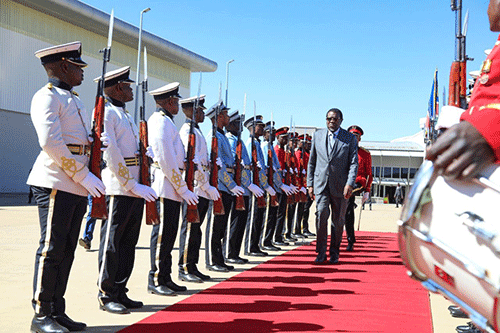PRESIDENT Hage Geingob is in South Africa to participate in the BRICS-Africa Outreach and the BRICS Plus Dialogues.
The objective is to strengthen economic ties with members and attendees of this week’s historic BRICS summit.
According to a statement from State House, Geingob is expected to have bilateral meetings with Joko Widodo, Indonesian president, Xi Jinping, president of the People’s Republic of China and Pravind Kumar Jugnauth, prime minister of Mauritius.
Geingob is one of the invited leaders from nine African countries to partake in the BRICS-Africa Outreach and the BRICS Plus Dialogues in his capacity as the outgoing chairperson of the Southern African Development Community (SADC) Organ Troika.
BRICS, consisting of Brazil, Russia, India, China and South Africa, is holding its three-day 15th annual summit in Johannesburg this week and about 50 heads of state and government are in attendance at the summit.
The Namibian President will also deliver a statement in China-Africa Leaders’ Dialogue to be hosted by SA president Cyril Ramaphosa and Xi under the theme: ‘Promoting African Integration and Jointly Building a High-level China-Africa Community with a Shared Future’.
During the dialogue, Africa and China will have in-depth exchanges on ways of working together to advance their modernisation and foster a peaceful, just and open environment for development.
Building BRICS
Xi on Tuesday noted that over 20 countries are knocking on the door of BRICS. He said China hopes to see more countries joining the BRICS cooperation mechanism.
“Our door is wide open to anyone who wants to engage in cooperation with us. As a supersize economy, China will remain firm in advancing high-standard opening-up. We will continue to expand market access, cut the negative list for foreign investment, and further open the modern services sector,” said Xi when closing the BRICS Business Forum Leaders’ Dialogue.
It has also been reported that several African countries, including Algeria, Egypt and Ethiopia, have expressed a desire to join the economic bloc.
Obsession
Furthermore, Xi showed frustration with countries who are “obsessed with maintaining their hegemony”, that has gone out of its way to cripple the emerging markets and developing countries.
“Whoever is developing fast becomes its target of containment, whoever is catching up becomes its target of obstruction. But this is futile, as I have said more than once that blowing out others’ lamp will not bring the light to oneself,” said Xi.
He added that China will work with all other countries to speed up cooperation under the Global Development Initiative, strengthen drivers of global development, promote the reform of the WTO in a comprehensive and in-depth manner, meet common challenges together and make life better for people across the world.
The collective rise of EMDCs represented by BRICS, Xi noted, is fundamentally changing the global landscape. EMDCs have contributed as high as 80% of global growth in the past 20 years, and their share in the global GDP has increased from 24% about 40 years ago to more than 40% now.
“Whatever resistance there may be, BRICS, a positive and stable force for good, will continue to grow. We will forge a stronger BRICS strategic partnership, expand the BRICS Plus model, actively advance membership expansion, deepen solidarity and cooperation with other EMDCs, promote global multi-polarity and greater democracy in international relations, and help make the international order more just and equitable,” he assured.
Africa jam
Also, addressing the BRICS Business Forum Leaders’ Dialogue, Ramaphosa said changes that took place in BRICS economies over the past decade have done much to transform the shape of the global economy.
Together, the BRICS countries make up a quarter of the global economy, they account for a fifth of global trade and are home to more than 40% of the world’s population.
Ramaphosa noted trade between BRICS countries totalled some US$162 billion last year.
“The new wave of protectionism and the subsequent impact of unilateral measures that are incompatible with World Trade Organisation (WTO) rules undermine global economic growth and development. We therefore need to reaffirm our position that economic growth must be underpinned by transparency and inclusiveness. It must be compatible with a multilateral trading system that supports a developmental agenda,” he asserted.
Africa, according to Ramaphosa is a continent of great opportunity in the industrialisation process in a variety of sectors. The continent is rich in the critical minerals that will drive business success in the 21st century.
African countries, he said, have made it clear that investors of choice are those who will process the resources here, close to source.
“We are developing stronger regional value-chains that will connect a number of African countries, providing investors with diversity, strength and resilience. The success of the African Continental Free Trade Area will require a massive investment in infrastructure. We need to mobilise the substantial financing needed to build the roads, ports, rail, energy and telecommunications networks that will enable industrialisation and trade,” noted the South African President.
Furthermore, while opening the BRICS Summit Open Plenary session yesterday, Ramaphosa said as for his country, its position remains that diplomacy, dialogue, negotiation and adherence to the principles of the United Nations Charter are necessary for the peaceful and just resolution of conflicts.
“We are concerned that global financial and payments systems are increasingly being used as instruments of geopolitical contestation. Global economic recovery relies on predictable global payment systems and the smooth operation of banking, supply chains, trade, tourism and financial flows. We will continue discussions on practical measures to facilitate trade and investment flows through the increased use of local currencies,” added the president.
Caption: P


